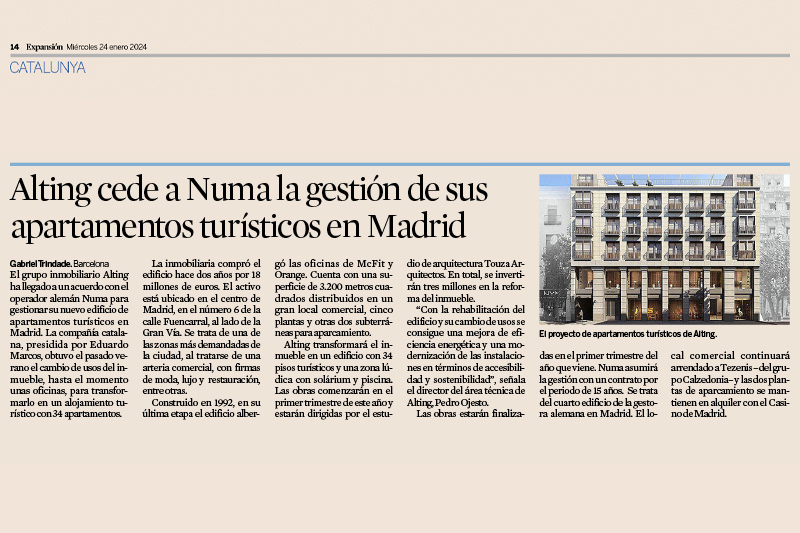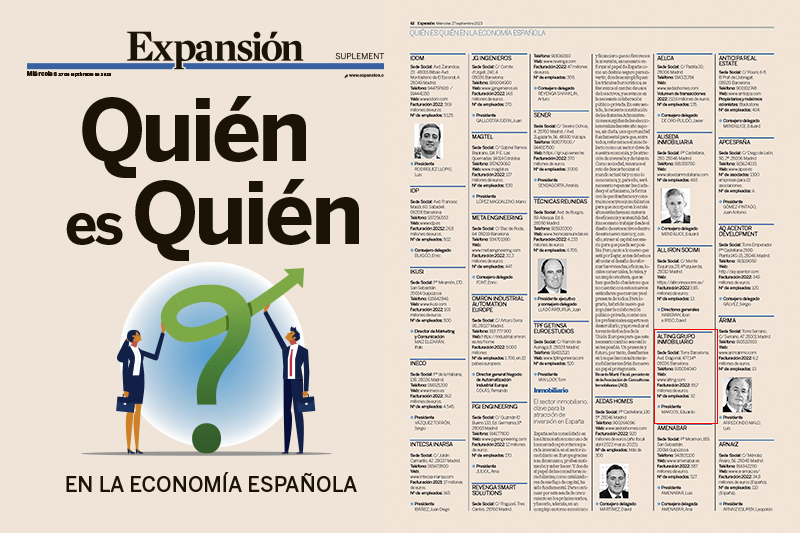On 5 February of this year, the Parliament of Catalonia validated a new decree law on housing which establishes, among other issues, the obligation to offer a social rentfor all people or families in situations of vulnerability or social exclusion.
This new measure only affects property owners with more than 15 homes, so for owners with up to 15 properties, this new law changes nothing.
Below, our Legal Director, Vanessa Rubiras, outlines and specifiesthe requirements that are necessary for apply this measure.
For more information, contact gestiondepatrimonios@alting.com.
LEGAL NOTE ON THE OBLIGATION TO OFFER SOCIAL RENTAL HOUSING TO TENANTS WHO CANNOT PAY THE RENT AND/OR WHOSE RENTAL CONTRACT EXPIRES
On 30 December 2019, Decree Law 17/2019, dated 23 December 2019, on urgent measures to improve access to housing, entered into effect, and it reached full effectiveness when it was confirmed by the Parliament of Catalonia on 4 February 2020.
This Decree Law amends, among other norms, Law 24/2015, dated 29 July 2015, on urgent measures to cope with the housing and energy poverty emergency, and it stipulates that before filing an eviction claim over failure to pay rent and/or expiration of the rental contract, “Large Owners” of homes have to offer tenants who can prove that they are in a situation of residential exclusion social rental housing.
1. The subjects who are considered Large Owners and are obligated to offer social rental housing, are the following:
- Physical persons who own more than 15 homes in Catalonia and file an eviction claim over failure to pay rent and/or expiration of the rental contract.
- Legal entities which, either alone or via a group of companies, own more than 15 homes in Catalonia and file an eviction claim over failure to pay rent and/or expiration of the rental contract. The Decree Law has stipulated two exceptions that may be applied to legal entities exempting them from having to offer their tenants social rental housing:
- If more than 15% of the inhabitable area owned by the legal entities (or group of companies) is classified as social rental housing. If they are interested, they may request a change in the classification of their pre-existing properties from open housing to social rental housing.
- If the legal entities are considered social housing developers according to the provisions of Article 51.2 of Law 18/2007, dated 28 December 2007.
2. Subjects who have the right to benefit from social rental housing:
People who can prove that they are at risk of residential exclusion, as defined in Article 5 of Law 24/2015, will have the right to benefit from social rental housing. People at risk of residential exclusion means those who alone or in cohabitation units (who do not necessarily need to have a sentimental and/or kinship relationship):
- Who own no home of their own in Catalonia.
- Whose income is below the following thresholds:
- People living alone: 2 IRSC (Zone A €21,247.28/year).
- Cohabitation units: less 2.5 IRSC (Zone A depending on the number of members between €26,000 and €28,500/year).
- Cohabitation units with disabled persons under their care: less 3 IRSC (Zone A depending on the number of members between €31,500 and €34,000/year).
To calculate the annual income of the person and/or cohabitation unit, the wages and/or benefits from the past three months will be taken into account and extrapolated for the entire year.
The income of the cohabitation unit should be weighed based on the coefficients established in the Right to Housing Plan (number of people, town, disabilities, etc.). In order to facilitate this calculation, the Housing Agency of Catalonia has set up a weighed income calculator which can be accessed at the following link: http://agenciahabitatge.gencat.cat/calculadoraLSO.
On an exceptional basis, cohabitation units with higher incomes than those shown in the preceding paragraphs may benefit from social rental housing if they have a report from social services accrediting an imminent risk of losing their home, and they have no alternative housing.
3. Offer of social rental housing:
Before filing eviction claims over failure to pay rent or expiration of the rental contact, Large Owners must first send a registered fax with return receipt with certificate of content to the tenant, in which they formally ask them to provide the documentation needed to verify whether they are in a situation of risk of residential exclusion within 30 days, and telling them that their data may be given to the municipal services of their town hall and to the Housing Agency of Catalonia so that the required residential exclusion report can be issued.
If they receive no response or the tenant does not deliver the documentation needed to make the required verification, a claim may be filed so the Court can offer the social rental housing. If the tenant formally refuses the social rental housing, an eviction claim may be filed forthwith.
Once the documentation has been checked, if there is a risk of residential exclusion, the owner must offer a social rental housing contract for a period of 5 to 7 years depending on whether the owner is a physical person or legal entity, and this contract must state:
- The income of the cohabitation unit.
- The contractual rent (which can include neither the property tax, nor homeowners’ association fees, nor other taxes/expenses).
- Identification of the home offered. The Catalan Housing Agency notes that the home previously rented should be given priority, but that another home may be offered. If it is in the same township, it must be accepted, and if it is in another township, a report from social services must be requested confirming that moving to another town will not negatively affect the situation of risk of exclusion. The alternative home must meet the inhabitability requirements according to the number of members in the cohabitation unit. If an alternative home is proposed, it must be shown to the tenant before the contract is formalized.
To calculate the social rent, the weighed income of the cohabitation unit must be considered and cannot exceed:
- 10% of the income of the cohabitation unit less 0.89 of the IRSC.
- 12% of the income of the cohabitation unit less 0.95 of the IRSC.
- 18% of the income of the cohabitation unit less or = 0.95 of the IRSC.
The social rent can be calculated using the calculator set up by the Housing Agency of Catalonia at the following link: http://agenciahabitatge.gencat.cat/calculadoraLSO.
The town hall where the home is located and the Housing Agency of Catalonia must be notified of the offer of social rental housing within 3 days after it is issued. The Housing Agency of Catalonia has asked that this notification be sent to the email set up for this purpose (comunicacioreallotjament@gencat.cat).
The social rental housing contract must obligatorily be extended for a new period of 5/7 years in the event that upon its expiration the person or cohabitation unit can prove that they are still in a situation of risk of housing exclusion.
4. Period of validity of these urgent measures:
Decree Law 17/2019, dated 23 December 2019, stipulates that the obligation to offer social rental housing shall remain in force for THREE (3) YEARS after the regulation enters into force, that is, until 31 December 2022.
(1) Any reference to financial entities, investment funds, etc., is excluded from this Note.
(2) IRSC: Income sufficiency indicator of Catalonia.





